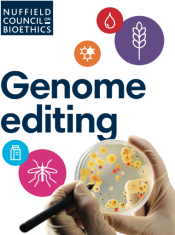Heritable human genome editing: the National Academies/Royal Society report
By Peter Mills,
Nuffield Council on Bioethics
| 09. 08. 2020
The Consensus Study Report of the International Commission on the Clinical Use of Human Germline Genome Editing convened by the US National Academies of Medicine and Sciences and the UK’s Royal Society was published on 3 September.
Heritable human genome editing is a substantial report and stands as a worthy contribution to discussion of heritable human genome editing (HHGE) in the English-speaking world alongside the National Academies’ earlier (and broader) report, Human Genome Editing, science, ethics, and governance (2017) and our own Nuffield Council report, Genome editing and human reproduction: social and ethical issues (2018).
There are many good things about this report. It is clear, thoughtful and detailed. The Commission has bent itself earnestly to fulfilling the task given to it by the commissioning academies. The coverage of the current state of the science, the prospects for the use of HHGE in the clinic, and the presentation of its potential applications manages to be both thorough and readable. It strives constantly to keep its feet on the ground, both through repeated reference to the technical uncertainties that should still...
Related Articles
By Katrina Northrop, The Washington Post | 04.06.2025
photo via Wikimedia Commons licensed under CC by 3.0
China's most infamous scientist is attempting a comeback. He Jiankui, who went to jail for three years after claiming he had created the world's first genetically altered babies, says he remains...
By Anumita Kaur [cites CGS’ Katie Hasson], The Washington Post | 03.25.2025
Genetic information company 23andMe has said that it is headed to bankruptcy court, raising questions for what happens to the DNA shared by millions of people with the company via saliva test kits.
Sunday’s announcement clears the way for a new...
By Peter Wehling, Tino Plümecke, and Isabelle Bartram
| 03.26.2025
This article was originally published as “Soziogenomik und polygene Scores” in issue 272 (February 2025) of the German-language journal Gen-ethischer Informationsdienst (GID); translated by the authors.
In mid-November 2024, the British organization Hope not Hate published its investigative research ‘Inside the Eugenics Revival’. In addition to documentating an active international “race research” network, the investigation also brought to light the existence of a US start-up that offers eugenic embryo selection. Heliospect Genomics aims to enable wealthy couples to...
By Frank Landymore, Futurism | 03.18.2025
You can only throw so much money at a problem.
This, more or less, is the line being taken by AI researchers in a recent survey. Asked whether "scaling up" current AI approaches could lead to achieving artificial general...




